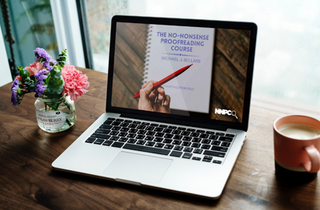|
Welcome to this week’s Proofreading Roundup, in a week when a streaming-service movie won the Best Director Oscar at the Academy Awards, the disturbing online phenomena (and moral panic) of Momo hit the headlines, and the World Bridge Federation suspended Geir Helgemo after he failed a random drug test.
This week’s weird words A proofreader without a vast vocabulary is at a considerable disadvantage. So, every week we’ll be introducing you to some of the more unusual words to grace the English language.
This week’s tricky words Even exemplary proofreaders have their little blind spots. The No-Nonsense Proofreading Course provides a comprehensive list of the tricky words that can trip up even the most experienced proofreader. Here are just three of them:
This week’s proofreading exercise From Seller of the Sky by Dave Dryfoos. "It's winter, my boy. We'd freeze." "You've said it's pretty in winter! You took the money for the certificate." "I suppose you'll grow away from your parents soon anyhow; I suppose you have to.... Get your warmest clothes and meet me at emergency exit four." My grandfather talked it over with his sister Annie and of course they didn't have any warm clothes, but they'd heard so often from Old Arch about the cold that they put on two sets of tights apiece, and two pairs of socks, and then they hunted for the emergency exit. They'd never been there before. They didn't know anyone who had. The signs pointing to it were all worn and defaced. And it was a long way to go. After a while Annie began to hang back. "How do we know the exit will work?" she asked. "And how will we get back in if we ever do get out?" "You don't have to come," my grandfather said. "But you'll have to find your own way home from here." "I'll bet I could," she said. "But I'm not going to. I don't think Old Arch will even be at the exit." But he was. He looked at them carefully to see how they were dressed. "You mean trouble for me, girl," he told Annie. "They'll think I took you along to make love to." She had just reached that betwixt and between stage where she was beginning to look like a woman but didn't yet think like one. "Pooh!" she said. "I can run faster and hit harder than you can, Arch. You don't worry me a bit." Old Arch sighed and led them through the lock. They stepped out into a raging snowstorm, which soon draped a cloak of invisibility over them. Neither my grandfather nor Annie had ever smelled fresh air before. It threatened to make them drunk. Their nostrils tingled and their eyes misted over and they’re breath steamed up like bathwater. For the first time in their lives, they shivered. When the City was out of sight in the storm, they stopped for a moment in the ankle-deep snow and just listened. They held their breaths and heard silence for the first time in their lives. Old Arch reached down and picked up some soft snow and threw it at them. They pelted him back, and then, because he was so old, attacked each other instead, shouting and throwing snowballs and running aimlessly. Old Arch soon checked them. "Don't get lost," he said. "We're walking downhill. Don't forget that. We're going into a draw where there are some trees." He coughed and drew his rags about him. "The city is up hill," he said. "If you keep walking around it, you'll find a way in." His tone was frightening. Annie clung to my grandfather and made him walk close to the old man. It was clear the old man didn't have enough clothes on. He staggered and leaned hard on my grand father. They kept moving down the slight grade. They saw no sky and little of anything else. The snow was like a miniature of the City's dome, except that this dome floated over them as they walked. Its edges were only about fifty yards off. "Where are the Outsiders?" my grandfather asked. "Aren't there people here?" "They're miles away," Arch told him. "And indoors. Only fools and youngsters are out in this blizzard." "Fool’s is right," Annie said tartly. "There was supposed to be sky. And there isn't." Errors:
If you have any comments, I'd love to hear them. You can leave them below. I hope to see you back here, next week, for another Proofreading Course Weekly Roundup. If you’re considering a career in proofreading, you might want to consider my great-value proofreading course. Click here for details.
0 Comments
Too late, the proofreader realizes he’s made a terrible mistake. He thought it was Wednesday. He was wrong. Its Thursday. If he’d known it was Thursday, he wouldn’t have left his car parked in front of the house. If he’d known it was Thursday, he would have parked his little Audi in the next street, just like he has done for the last seven or eight months. Why does he park his car in the next street on Thursdays? Because Thursday is the day his sister, a sales rep for a soft drinks company, visits a number of customers in the proofreader’s area. Thursday is the day his sister drops by in search of coffee and conversation. It isn’t that he in any way dislikes his sister; not at all. In fact, he loves Bonnie; she’s fantastic. He couldn’t hope for a better big sister. It’s just that once she starts talking she just can’t seem to stop. This would be fine if it was a Friday evening or a Saturday afternoon. But it isn’t Friday evening, and it isn’t Saturday afternoon. It’s Thursday afternoon. And not just any Thursday afternoon. It’s the last Thursday afternoon of the month, which means he’s currently proofreading the latest edition of Botanical Bulletin, which is due to go to press in just a few days time. The proofreader loves and hates Botanical Bulletin in equal measure. He loves the fact that he gets paid handsomely to proofread it. He loves the fact that it’s regular work. He loves the fact that he gets on extremely well with the publication’s editor, Joanne Kirby. He hates the fact that, thanks to the likes of Theophrastis, Dioscorides, Pliny the Elder, Leonhart Fuchs and Linnaeus he has to hack his way through the dense forest that is botanical nomenclature. Botanical Bulletin is a serious publication. Every plant, algae or fungi must be identified by its ‘correct name’ in accordance with the International Code of Nomenclature for Cultivated Plants. This means that the common daisy must be referred to as Bellis perennis, the sweet briar rose must be referred to as Rosa rubiginosa and the common dandelion must be referred to as Taraxacum officinal. Spell-checking software is of absolutely no use in this situation. The proofreader must lean heavily on his now-battered copies of The Cambridge Illustrated Glossary of Botanical Terms and Plant Names: A Guide to Botanical Nomenclature, as well as a host of online resources. When none of these prove helpful, he calls Joanne who refers him to one of the many botanists who contribute to Botanical Bulletin. It is, quite frankly, a colossal headache. The situation is manageable as long as the proofreader is able to give Botanical Bulletin the benefit of his full attention. This will not be possible if Bonnie sees his car parked outside and decides to invite herself in for caffeine and company. The proofreader lays down his read pen on the proofs for Botanical Bulletin and starts toward the front door. Maybe there’s still time to move my car, he thinks. He thinks wrong. The doorbell chimes. Click on Read More below to find out what the mistakes were.
The Apostrophe CatastropheThe proofreader does not like to think of himself as a pedant. He doesn’t see himself as some kind of self appointed guardian of the English language. He is not a fully paid-up member of the Grammar Police. He does not count himself among those who behave like the Agents of Syntax. He would be deeply uncomfortable in the presence of anyone who perceived themselves as some kind of Punisher of Poor Punctuation.
He is none of these things. He is a proofreader. Moreover, he is a professional proofreader. His role is not to sneer or deride. His role is to highlight errors in order to transform a document from something that might only be considered a draft into something that is fit for public consumption. His job is to safeguard the reputation of his clients by ensuring they do not publish material that may make them appear foolish or may be unhelpful to their customers. He has also, on occasion, uncovered errors that could have resulted in serious financial loss. For example, he once noticed that an item of jewelry was being sold at a fraction of its value, due to a misplaced decimal point. These are the things that give him purpose. He is nothing if not practical. He is not a snarling Grammar Nazi, using his dictionary as a weapon. He is a helpful professional. Sneering is not his thing. But the sign drives him mad. The sign invokes a slight curling of the lip that may, in time, become something that might reasonably be described as a sneer. He hopes this is not the case but he is not optimistic regarding the outcome. He has tried to ignore it but it is impossible. It wouldn’t be so bad if he passed it infrequently. Unfortunately, he has to pass the sign every week day morning as he takes his children to school. The sign is high up on the red brick wall of a building that the proofreader thinks used to be a bank. The sign says Schoolteachers Friendly Society. Now, the proofreader never takes the absence of an apostrophe lightly. Apostrophes are very important. Apostrophes denote possession. Apostrophes denote contraction; in this role, the proofreader thinks of the apostrophe as a small fragment of debris left over when two words smash into one another. He would never deny the vital function that apostrophes often play. All that being said, he has, on occasion, looked the other way. He hasn’t felt good about it but he has allowed his head to rule his heart and not the other way round. These occasions when he has had to let these grammatical transgressions pass unchallenged almost always involve signs, logos or other elements were typographical design is a governing factor. He understands that significant design elements must occasionally be considered exempt from the rules that govern the printed word. Apostrophes are awkward little buggers. They are a typographical sore thumb, spoiling the fine line of a neatly designed piece of type. The proofreader simply can’t make the exception this time. This is the Schoolteachers' Friendly Society. The very name speaks of academia and education. An exception can’t be made. The proofreader walks past, shaking his head. He reaches up and touches a finger to the left corner of his mouth. Yes, that curve is definitely getting bigger. Any day now, he’ll have a fully fledged sneer. To find out what the errors are, click on 'Read More' below. The proofreader stares at the bifurcated nib of his red pen and tries not to sob. He turns his attention to the manuscript he is currently proofreading. Where he has scored through the word anunciate, there is a distinct doubling of the line. He sighs and returns his gaze to the pen. Its his favourite pen, a uni-ball Eye Micro. He loves this pen. The nib delivers a beautiful 0.5mm line of fade resistant ink that refuses to bleed, even on low-grade paper. The proofreader is almost certain that the only paper capable of causing the Eye Micro’s ink to bleed is super-absorbent toilet paper. He looks at the ink window in the pen’s barrel and sees that he hasn’t even used half of that clean, bright ink. Insult to injury, he thinks. Although he knows he’s wasting his time, the proofreader draws a vertical line down the empty right-hand margin of the manuscript. Unsurprisingly, the mark consists of two distinct elements running in parallel to one another. “Well, that’s that, then,” he says. He doesn’t drop the pen into the wastepaper basket next to his desk. Instead, he reaches over his inert laptop and picks up an ornately carved box. The box is made of mahogany or some similar dark timber. The carvings depict an elaborate knot of serpents. It is the kind of box that might hold cigars. The proofreader opens the box. It doesn’t contain cigars. It contains pens. This is where the proofreaders red pens go when they die. This is the red-pen equivalent of the fabled elephant’s graveyard. There are several Eye Micros, a handful of Pilot Precise V5 Extra Fine Points, a trio of Pentel R.S.V.P. 0.7mm Ballpoint Pens and a couple of Sharpies. The proofreader places the Eye Micro in the cigar box, closes the lid and returns the box. “No time for sentimentality,” he says. “I’ve got work to be getting on with.” He looks down at the page he has been proofreading. It’s been hard going. It’s a treatise entitled The Death of Received Pronunciation and the Decline of the BBC. He can’t help wondering if he’d subconsciously sabotaged his pen in order to bring this dreary exercise to a premature halt. “Never,” he says. “I’d never knowingly hurt a pen.” He opens the top drawer of his desk and reaches inside. An expression somewhere between horror, astonishment and embarrassment animates his face. He pulls the drawer open as far as it will go and looks inside. “No pens,” he says, disbelieving. “No pens.” This is a disaster. This is an unprecedented disaster. He has been a proofreader for the better part of 20 years and, in all that time, he has never been without a pen. The proofreader wonders what it must mean. He wonders what it must portend. Click 'Read More' below for the answers. The proofreader’s office is at the back of the house, to the left of the utility room. It has a small window with a view of the garden. There’s a stone bird table in the middle of a neatly trimmed lawn. There are rhododendren bushes and buddleias at the end of the garden and, down the sides, narrow flowerbeds overflowing with white, pink and blue alpine plants. The view is pleasant but not so pleasant as to distract the proofreader. His attention is entirely focused upon the typed manuscript on his desk. In one hand, he holds a tatty business card. In the other, he holds a red pen. He slides the business card just beneath the line of text he is reading, moving it at a slow pace. Despite his proffesion, he gives the impression of someone who isn’t altogether very good at reading. He is about ten lines down the page, when the business card comes to a sudden standstill and the hand holding the red pen swoops toward the text. The proofreader strikes a line through the word ‘absorbtion’. In the margin, paralell to where he has made his mark, he writes the word ‘absorption’. Then, to no one, he says, “To be fair, that is a tricky one. Absorption. Absor-puh-tion.” The manuscript is full of tricky words. It’s a piece of editorial about classroom acoustics. The author is an architect and the piece is intended for publication in the Journal of Architectural Technicians. The business card recommences its slow tracking until it reaches the end of the page. The red pen is not employed again. The proofreader turns the page over to its blank side and places it on a pile of similarly blank pages. The pages aren’t entirely blank, however; here and there, the blushing ghosts of proofreading marks bleed through from the other side of the paper. Before continuing to proofread the editorial, he puts down his pen and turns to look out of the window. The proofreader knows it is important to rest his eyes, to focus on something further from his face than the surface of his desk. There is a robin on the bird table, pecking at the seeds and berrys the proofreader placed there that morning. He wonders what the robin is doing there. It’s late June. He seems to remember a time when robins only appeared in the winter months. He wonders if global warming has interfered with the bird’s biological thermostat and it no longer knows whether it’s coming or going. Perhaps, it can no longer distinguish June from November. He considers the possibility that robins have always been around in June. “Could be I’ve just never noticed them before,” he says. He looks at the dark, blank screen of his laptop. It would be easy to fire it up and click on the Google icon on his taskbar. In no time at all, he’d be quite the robin expert. Not only would he be fully conversant with the bird’s migratory habits, he’d be familiar with its diet, natural predators, nesting habits, wingspan, body mass and just about everything else robin-related. The proofreader resists. If distraction is the enemy of the proofreader, then Google is the proofreader’s arch nemesis. Google is to the proofreader what Lex Luther is to Superman, what Moriarty is to Sherlock Holmes, what Khan is to Kirk. The Proofreader picks up his red pen and the tatty business card. He gets back down to work. Click 'Read More' below for the answers.
First of all, allow me to apologize. It's been far too long since I've posted anything on this site.
Well, that changes right now. Over the next few months, I’m going to be posting a whole series of free proofreading exercises. These will come in the form of extracts from an imaginary novel. This being an imaginary novel, we don’t really need to give it a title. But, in the interest of verisimilitude, let’s call it The Life and Death of a Freelance Proofreader. Each extract will contain a number of deliberate errors. The errors will be listed at the end each extract, when you click the 'read more' button. As a work of fiction (or pseudo-fiction), The Life and Death of a Freelance Proofreader is written in a slightly informal fashion. This means that there will be things you may view as errors. These may be the conscious deviations from accepted grammar or style that naturally occur when an author writes creatively. Please feel free to use the comments field to highlight anything you feel I’ve overlooked or any occasions when you feel I’ve strayed from ‘informal’ into ‘slapdash’. I look forward to a healthy debate. And I’m more than happy to be set straight. I'll be posting the first proofreading exercise tomorrow. I’ve just added 10 new proofreading exercises to the website. Help yourself. Just right-click and download.
If you’re short of time, you can download all the proofreading exercises for the price of a Tweet. Just click on the ‘Pay with a Tweet’ button and, once you’ve Tweeted, you’ll be taken to a new download page, where the exercises are available in a single, convenient bundle. The exercises are here. The ‘Pay with a Tweet’ button is over on the right-hand side of the same page. Good luck with the exercises. I’ll be adding more very soon. If there’s one recurring message throughout this blog, it’s this: never, never, never pay for proofreading exercises. Never. If a proofreading course boasts proofreading exercises as part of its offer, then the chances are you are paying for them when you pay for the course. Which is crazy, because the internet is heaving with free proofreading exercises; you just need to know where to look.
If there is another recurring message running through this little blog of mine, then it is the importance of testimonials in creating a sturdy reputation for yourself as a freelance proof reader. And, more often than not, the two go hand in hand. Wherever there are free proofreading exercises, there are plentiful opportunities for harvesting testimonials. I’ve already mentioned writing forums, Yahoo! Answers and Constant Content. Well, here’s another great source of free proofreading exercises/testimonials: http://www.duotrope.com/ That’s the URL for Duotrope. Duotrope is a resource to help writers find publishers who are currently seeking submissions. I know what you’re thinking: Well, that’s great if you’re an aspiring writer, but I’m an aspiring proof reader. What’s in it for me? On the face of it, Duotrope is a resource for writers, but dig a little deeper and you find a massive database of publishers. Lots of these publishers fall under the category of ‘small press’ and are unlikely to be able to afford the services of professional proof readers. So, when you get in touch offering free proofreading services in exchange for testimonials (providing you do a good job, of course), I’d be surprised if they didn’t jump at the opportunity to work with you. Just think how impressive it will look on your resume or website to have testimonials from companies with names like Woodland Press, Hourglass Books and Permuted Press? Well, what are you waiting for? Those of you who have read the No-Nonsense Proofreading Course eBook will know that I go to great pains to emphasise the importance of developing a strong reputation and the part that testimonials play in this crucial process.
Well, I’ve just stumbled across a means of getting your hands on free proofreading exercises and a decent source of testimonials. Where? Yahoo Answers, that’s where. Sign up for Yahoo Answers. Key in the search phrases, ‘proofreading’, ‘proofreader’ or ‘proof reader’ and narrow your options down to ‘open questions’ only. You’ll be presented with a whole host of people looking to have documents proofread: essays, reports, dissertations, short stories, novels, that kind of thing. Now, these people aren’t looking to pay you for your services. Not in cash, anyway. However, you could ‘work for rep’. In other words, you say, “I’ll proofread your essay, so long as you provide me with a glowing testimonial (providing I earn it, of course).” It’s a great opportunity for the novice or trainee proof reader to practice their technique on genuine material and grab a few testimonials into the bargain. Put these testimonials on your website or feature them as part of your promotional activity. Instant credibility! If you haven’t read the eBook yet, you’ll find an abundance of this kind of advice. Click here to find out more. I’ve just added two more proofreading exercise here. If you take a look at them, you’ll find they differ from practically every other proofreading exercise you’ve encountered in one significant aspect.
Each proofreading exercise contains only a handful of errors. Most proofreading exercises are crammed with spelling mistakes and grammatical slip-ups. Every other line features a glaring faux pas of one sort or another. In the real world, you’ll be proofreading copy that is likely to have been produced by professionals, by people who take the quality of their output very seriously. They actually don’t want to have their inadequacies pointed out to them, so they’ll be doing their level best to create error-free documents. The proofreading exercises on this website, like The No-Nonsense Proofreading Course itself, will prepare you to actively pursue and carry out genuine proofreading assignments. In the real world. Not in some bizarre parallel universe where documents are created by bumbling individuals incapable of stringing a sentence together. Good luck with the exercises! |
Details
Testimonials
“I am one of those many fools who paid a huge amount of money for a useless course. This book... has opened so many doors for me. I now look on Mike as my mentor as I embark on a career. Thank you Mike.” Emma Steel, Proofreader and International Structural Editor. “ I thoroughly enjoyed the course and am so glad that I decided to take it... the whole experience was invaluable. My proofreading service is now well established and your course played no small part in getting it off the ground.” Hache L. Jones, Proofreader. “I'd just like to thank you first of all for writing such a great, straight forward eBook, and then going above and beyond what I would even expect as a customer by providing us, completely free of charge, updated versions months later!” Rachel Gee, Trainee Proofreader. “What can I say? Worth every penny and then some! God Bless! This a fabulous course.” Teresa Richardson, Proofreader. “As someone who has effectively been proofreading for thirty years, I found Mike’s No-Nonsense Proofreading Course an invaluable introduction and a very useful practical guide to many aspects of this discipline. I can wholeheartedly recommend it as the ideal starting point, and much more besides.” Jeremy Meehan, Proofreader. Blog AuthorMy name's Mike Sellars and I'm an experienced proofreader and the author of The No-Nonsense Proofreading Course. Click here to find out more about me. The No-Nonsense Proofreading CourseA Fraction of the Cost of Other Proofreading Courses NOTE: Stock is currently limited to 10 per day, so we can continue to deliver exceptional after-sales service, answer queries and provide open-door support. Credit card and PayPal payments accepted. “As someone who has been proofreading for 30 years, I found Mike’s course an invaluable introduction and a very useful practical guide to many aspects of the discipline. I can wholeheartedly recommend it.” Jeremy Meehan, Proofreader. Still want to find out more? Click here. Proofreading Categories
All
Proofreading Archives
July 2024
|
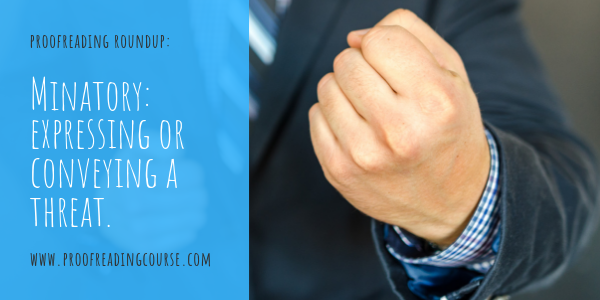
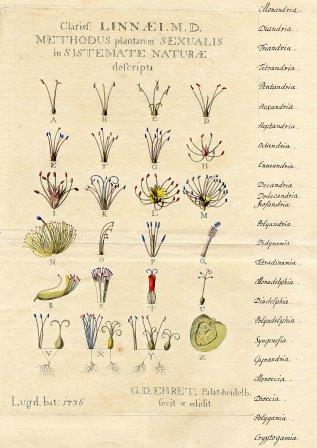
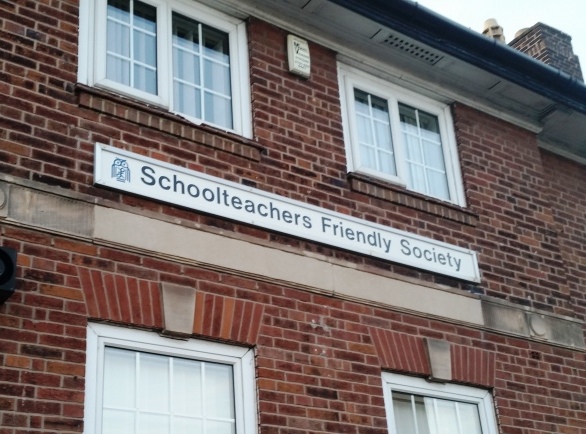
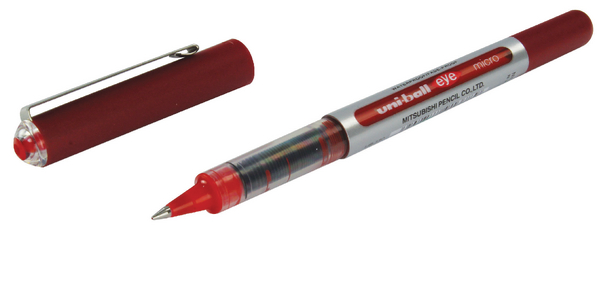


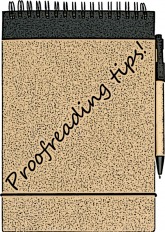


 RSS Feed
RSS Feed
